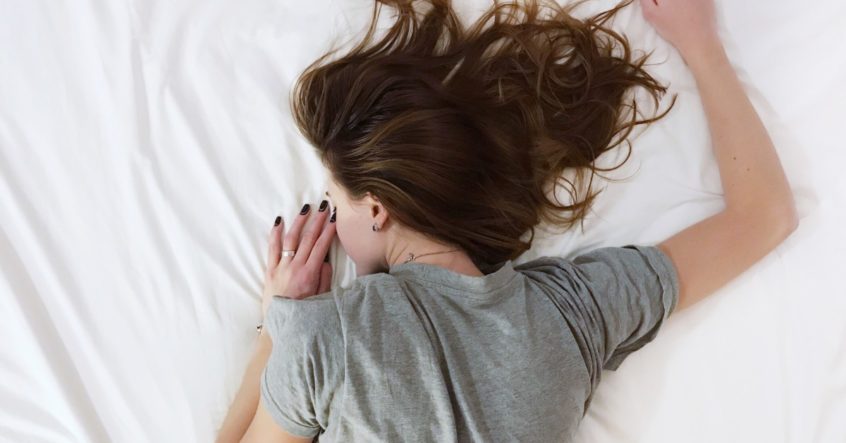Here at Viteyes, we focus a lot of our attention on blue light and its effects on our vision and eye health. In a digital world where it is difficult to reduce and impossible to eliminate screen time, the best thing we can do is educate people and be proactive in offering solutions. In today’s post, we want to take a break from discussing blue light’s harmful effects on the structures of our eyes and zero in on another topic that affects our vision and overall health and wellness — sleep.
Sleep is something that millions of Americans struggle to get enough of. In fact, one study revealed that 27% of people have trouble falling or staying asleep most nights and 68% of study participants struggled with sleep at least once a week. Too little sleep has a dramatic impact on our health, mood, and quality of life. Consistently poor sleep has been linked to heart disease, type 2 diabetes, depression, and obesity. Is harmful blue light exposure to blame?
The Science Behind Light and Sleep
Our bodies use sunlight to regulate cell regeneration and hormone activity. Some of the hormones that are heavily influenced by sunlight include melatonin, cortisol, prolactin, and thyroid-stimulating hormone (TSH), all of which help regulate our sleep-wake cycle and drive our circadian rhythm. Light is detected by the retina in the eye, which sends signals to the hypothalamus, letting the brain know that it is getting dark outside and that it should trigger sleep hormones. And, when the sun rises, it does the opposite and alerts the hypothalamus to release cortisol to wake up.
When artificial light, namely blue light, is introduced, it confuses the body and throws the circadian rhythm off, disrupting sleep. This is especially true when the body has been alerted to release sleep hormones and the eyes then detect bright blue lights from sources, including television, computer, or phone screens. Even LED lights in rooms and nightlights reduce melatonin release by nearly 85% — it’s no wonder we can’t sleep!

How to Improve Your Sleep Despite Blue Light Exposure
We’ve said it before and we’ll say it again, it is nearly impossible to eliminate blue light exposure. The key to not letting it negatively affect your health and sleep is to manage it safely. Some things you can do to help reduce the impact of blue light on your sleep include:
- Avoid screen time after dark — let your body know it’s time for rest.
- Use blue light filters on screens that reflect the time of day.
- Get plenty of natural sunlight — if you can’t go outside, open the blinds.
- Avoid LED bulbs in bedside lamps and nightlights.
- Turn down lights in your home 1-2 hours before bed, including screens.
- Keep your bedroom completely dark during sleep hours.
- Improve eye supporting nutrition.
- Take a lutein and zeaxanthin supplement.
The Benefits of Lutein and Zeaxanthin on Sleep Quality
The carotenoids lutein and zeaxanthin work to increase macular pigments in the eye and help reduce photo-oxidative stress by effectively filtering blue light from penetrating the eye. Lutein and zeaxanthin can be found naturally in the diet in bright red, yellow, and orange foods, including carrots, peppers, kale, and other fruits and vegetables. These carotenoids help deliver the recommended dose that may be missed in the daily diet. Studies show that people who supplemented with a lutein and zeaxanthin vitamin daily experienced a 60% improvement in sleep disturbances, reduced daytime dysfunction related to fatigue, significantly improved sleep quality, and decreased need for sleep interventions for medications after just three months. Not only that, but daily supplementation also may reduce eye strain, eye fatigue, blurry vision, difficulty focusing, dry and irritated eyes, and headaches that are associated with lack of sleep.
Visit these online resources to learn more about the positive effects of lutein and zeaxanthin supplements on sleep.
Lutein and Zeaxanthin Isomers Can Protect Against Undesirable Effects of Blue Light
Macular Carotenoid Supplementation Improves Visual Performance, Sleep Quality, and Adverse Physical Symptoms in Those with High Screen Time Exposure
Lutein and Zeaxanthin Isomers Effect on Sleep Quality: A Randomized Placebo-Controlled Trial
Viteyes® Blue Light Defender™
At Viteyes®, we understand the reliance on screens and technology and the struggle to reduce harmful blue light exposure. To help support optimal eye health and reduce the effects of artificial light, we offer Viteyes Blue Light Defender eye vitamins that contain lutein, zeaxanthin, and Astareal® astaxanthin for complete eye protection. Get relief and support your eyes to get the sleep you need with a blue light supplement from Viteyes. Visit us online to learn more about blue light or shop our entire product line today.
Related Article: A Mommy and Me Guide to Protecting Eye Health
